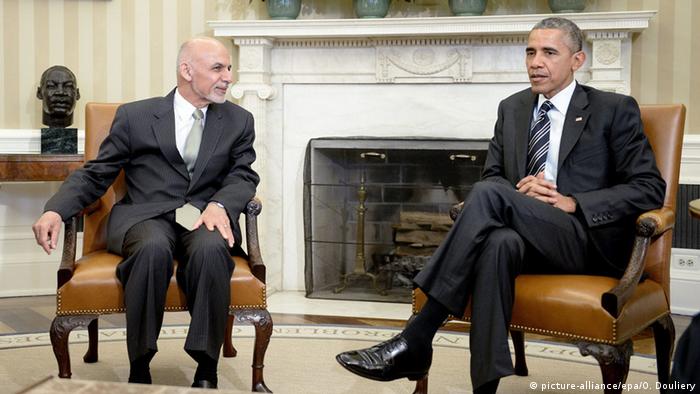By Florian Weigand
US President Barack Obama's decision to extend the military presence in Afghanistan is the right move. However, it lacks a well thought out exit strategy, says DW's Florian Weigand.
It should come as no surprise that Afghanistan is unable to shoulder the security burden on its own. Analysts, members of the military and Afghans themselves often warn that the gradual withdrawal of the Western forces is premature and the country might slide back into anarchy.
On the other hand, ever since the end of the ISAF mission in 2014, diplomats and politicians have stressed tirelessly that the Afghans are in the position to stabilize their own country. They've stated the country only needs some military advisers as part of NATO's follow-up mission to "resolutely support" where the country is headed.
It's easy to determine which of the two factions is right once you examine the facts. 2015 has been the bloodiest on record since the Taliban were ousted from power 14 years ago. Radical Islamists have been gaining control over more ground in the provinces - a development which has gone largely unnoticed by the rest of the world.
It took an emotional wake-up call for the West to take notice. For Berlin, that moment came when Kunduz - which was under Germany military control until last year- came under attack. For Europe, it was an influx of refugees from Afghanistan; for the US, it was the emergence of "Islamic State" (IS) - a spin-off of the failures in Iraq and Afghanistan.
On the other hand, ever since the end of the ISAF mission in 2014, diplomats and politicians have stressed tirelessly that the Afghans are in the position to stabilize their own country. They've stated the country only needs some military advisers as part of NATO's follow-up mission to "resolutely support" where the country is headed.
It's easy to determine which of the two factions is right once you examine the facts. 2015 has been the bloodiest on record since the Taliban were ousted from power 14 years ago. Radical Islamists have been gaining control over more ground in the provinces - a development which has gone largely unnoticed by the rest of the world.
It took an emotional wake-up call for the West to take notice. For Berlin, that moment came when Kunduz - which was under Germany military control until last year- came under attack. For Europe, it was an influx of refugees from Afghanistan; for the US, it was the emergence of "Islamic State" (IS) - a spin-off of the failures in Iraq and Afghanistan.
Obama's decision to keep troops in Afghanistan past 2016 is, therefore, the right one. The West must do everything it can to ensure calm in the region - not only for the sake of the Afghan people, but also for its own security interests and for politics back home. But Obama's decision comes too late. Horror stories from Afghanistan were needed to pave the way for President Obama to sell his decision to the US public.
So what now? There seems to be no comprehensive strategy behind the US pledge to extend its military presence in Afghanistan. Let's remember that the ISAF mission was directly linked to efforts by the international community to reconstruct the country, establish a functioning democracy and train local security forces. All this was designed to help Afghans determine their own future and prevent terrorists from regaining a foothold in the country. But all of these attempts failed.
And the situation has now worsened. The recent US decision to keep troops on the ground beyond 2016 includes no similar mission statement. This leaves behind a Kabul government which depends on Western support for its survival while exercising symbolic democracy. These are no solid foundations for a country which threatens to slide back into colonialism and anachronism. The fact is that Afghanistan is turning into a Western protectorate.
In this context, it doesn't really matter whether the US wields the scepter alone, in cooperation with NATO or even with the United Nations' blessing. As long as there is no clear mission statement and no efforts are made to strength Afghanistan's state structures or to engage in a serious dialogue with neighboring Pakistan and Iran, there will be no lasting peace in the country. One thing is clear: Not even the most liberal of Afghans will want to live in a protectorate.


No comments:
Post a Comment